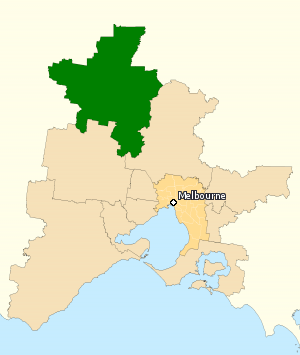Division of Bendigo
| Bendigo Australian House of Representatives Division | |
|---|---|
|
Division of Bendigo in Victoria, as of the 2016 federal election. | |
| Created | 1901 |
| MP | Lisa Chesters |
| Party | Labor |
| Namesake | Bendigo, Victoria |
| Electors | 109,615 (2016) |
| Area | 6,255 km2 (2,415.1 sq mi) |
| Demographic | Provincial |
The Division of Bendigo is an Australian Electoral Division in the state of Victoria. The division was created in 1900 and was one of the original 75 divisions contested at the first federal election. It is named for the city of Bendigo.
The division is situated on the northern foothills of the Great Dividing Range in North Central Victoria. It covers an area of approximately 6,255 square kilometres (2,415 sq mi) and provides the southern gateway to the Murray Darling Basin. In addition to the city of Bendigo, other large population centres in the division include Castlemaine, Heathcote, Kyneton and Woodend.[1]
The current Member for the Division of Bendigo, since the 2013 federal election, is Lisa Chesters, a member of the Australian Labor Party.
History
In the early years of federation the seat consisted of little more than Bendigo itself, but on later boundaries the seat has included towns such as Echuca, Castlemaine, Maryborough and Seymour.
Bendigo has been a marginal seat, changing hands regularly between the Labor Party and the conservative parties; typically mirroring voting patterns in state elections.[2] However, it has remained a Labor seat since the 1998 federal election. Bendigo has had 16 members, the highest number of any federal electorate, equal to Denison, Bass and Swan.[3]
Its most notable members have been its first representative, Sir John Quick, who was a leading federalist, and Prime Minister Billy Hughes who, although from Sydney, represented Bendigo for two terms at a time when the federal Parliament met in Melbourne, and who moved to the seat after leaving the Labor Party over conscription, holding the seat as the leader of the Nationalist Party.
John Brumby, who held the seat from 1983 to 1990, later became Premier of Victoria. Brumby was defeated in Bendigo at the 1990 election by a former state Legislative Councillor, Bruce Reid, who retained the seat narrowly in 1993 and 1996, before retiring at the 1998 election, when a 4.3% swing delivered the seat to Labor's Steve Gibbons. Reid has a minor claim to fame through being the third candidate in the contest for Liberal leadership between John Hewson and John Howard after the party's 1993 election defeat. Reid attracted one vote, presumably his own.[2]
Members
| Member | Party | Results | |
|---|---|---|---|
| Sir John Quick | Protectionist | 1901–1906 | |
| Independent Protectionist | 1906–1909 | ||
| Commonwealth Liberal | 1909–1913 | ||
| John Arthur | Labor | 1913–1914 | |
| Alfred Hampson | Labor | 1915–1917 | |
| Billy Hughes | Nationalist | 1917–1922 | |
| Geoffry Hurry | Nationalist | 1922–1929 | |
| Richard Keane | Labor | 1929–1931 | |
| Eric Harrison | United Australia | 1931–1937 | |
| George Rankin | Country | 1937–1949 | |
| Percy Clarey | Labor | 1949–1960 | |
| Noel Beaton | Labor | 1960–1969 | |
| David Kennedy | Labor | 1969–1972 | |
| John Bourchier | Liberal | 1972–1983 | |
| John Brumby | Labor | 1983–1990 | |
| Bruce Reid | Liberal | 1990–1998 | |
| Steve Gibbons | Labor | 1998–2013 | |
| Lisa Chesters | Labor | 2013–present | |
Election results
| Party | Candidate | Votes | % | ± | |
|---|---|---|---|---|---|
| Labor | Lisa Chesters | 37,396 | 38.35 | +1.79 | |
| Liberal | Megan Purcell | 36,956 | 37.90 | −1.77 | |
| Greens | Rosemary Glaisher | 10,749 | 11.02 | +1.72 | |
| National | Andy Maddison | 3,544 | 3.63 | −1.39 | |
| Family First | Alan Howard | 2,732 | 2.80 | +1.68 | |
| Animal Justice | Ruth Parramore | 2,146 | 2.20 | +2.20 | |
| Rise Up Australia | Sandy Caddy | 2,058 | 2.11 | +1.57 | |
| Independent | Anita Donlon | 1,922 | 1.97 | +1.97 | |
| Total formal votes | 97,503 | 95.40 | +1.11 | ||
| Informal votes | 4,705 | 4.60 | −1.11 | ||
| Turnout | 102,208 | 93.24 | −2.09 | ||
| Two-party-preferred result | |||||
| Labor | Lisa Chesters | 52,398 | 53.74 | +2.48 | |
| Liberal | Megan Purcell | 45,105 | 46.26 | −2.48 | |
| Labor hold | Swing | +2.48 | |||
References
- ↑ "Profile of the electoral division of Bendigo (Vic)". Current federal electoral divisions. Australian Electoral Commission. 1 October 2013. Retrieved 23 November 2013.
- 1 2 Green, Antony (11 October 2013). "Federal election 2013: Bendigo results". Australia Votes. Australia: ABC. Retrieved 23 November 2013.
- ↑ Bowe, William. "Seat of the week: Bendigo". The Poll Bludger. crikey.com.au. Retrieved 2015-08-13.
- ↑ Bendigo, VIC, Virtual Tally Room 2016, Australian Electoral Commission.
External links
Coordinates: 36°54′04″S 144°10′55″E / 36.901°S 144.182°E
